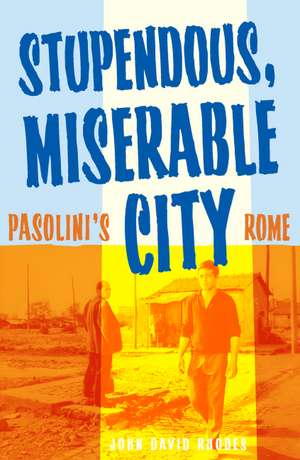Stupendous, Miserable City: Pasolini’s Rome
Autor John David Rhodesen Limba Engleză Paperback – 9 mar 2007
John David Rhodes places the city of Rome at the center of this original and in-depth examination of the work of Italian director Pier Paolo Pasolini—but it’s not the classical Rome you imagine. Stupendous, Miserable City situates Pasolini within the history of twentieth-century Roman urban development. The book focuses first on the Fascist period, when populations were moved out of the urban center and into public housing on the periphery of the city, called the borgate, and then turns to the progressive social housing experiments of the 1950s. These environments were the settings of most of Pasolini’s films of the early to mid-1960s.
Discussing films such as Accattone, Mamma Roma, and The Hawks and the Sparrows, Rhodes shows how Pasolini used the borgate to critique Roman urban planning and neorealism and to draw attention to the contemptuous treatment of Rome’s poor. To Pasolini, the borgate, rich in human incident, linguistic difference, and squalor, “were life”—and now his passion can be appreciated fully for the first time.
Carefully tracing Pasolini’s surprising engagement with this part of Rome and looking beyond his films to explore the interrelatedness of all of Pasolini’s artistic output in the 1950s and 1960s—including his poetry, fiction, and journalism—Rhodes opens up completely new ways of understanding Pasolini’s work and proves how connected Pasolini was to the political and social upheavals in Italy at the time.
John David Rhodes is lecturer in literature and visual culture at the University of Sussex.
Discussing films such as Accattone, Mamma Roma, and The Hawks and the Sparrows, Rhodes shows how Pasolini used the borgate to critique Roman urban planning and neorealism and to draw attention to the contemptuous treatment of Rome’s poor. To Pasolini, the borgate, rich in human incident, linguistic difference, and squalor, “were life”—and now his passion can be appreciated fully for the first time.
Carefully tracing Pasolini’s surprising engagement with this part of Rome and looking beyond his films to explore the interrelatedness of all of Pasolini’s artistic output in the 1950s and 1960s—including his poetry, fiction, and journalism—Rhodes opens up completely new ways of understanding Pasolini’s work and proves how connected Pasolini was to the political and social upheavals in Italy at the time.
John David Rhodes is lecturer in literature and visual culture at the University of Sussex.
Preț: 181.84 lei
Nou
Puncte Express: 273
Preț estimativ în valută:
34.80€ • 36.24$ • 29.41£
34.80€ • 36.24$ • 29.41£
Carte tipărită la comandă
Livrare economică 10-24 martie
Preluare comenzi: 021 569.72.76
Specificații
ISBN-13: 9780816649303
ISBN-10: 0816649308
Pagini: 240
Ilustrații: 25 halftones
Dimensiuni: 150 x 229 x 18 mm
Greutate: 0.29 kg
Ediția:First edition
Editura: University of Minnesota Press
Colecția Univ Of Minnesota Press
ISBN-10: 0816649308
Pagini: 240
Ilustrații: 25 halftones
Dimensiuni: 150 x 229 x 18 mm
Greutate: 0.29 kg
Ediția:First edition
Editura: University of Minnesota Press
Colecția Univ Of Minnesota Press
Recenzii
“In this remarkable book, John David Rhodes makes an invaluable contribution to scholarship on cinema and the city. Analyzing Pier Paolo Pasolini’s Rome films and his political and emotional engagement with the city, Rhodes has provided a fascinating and moving background to this period of Pasolini’s life, vision, and politics.” —Laura Mulvey
“John David Rhodes portrays the social and aesthetic complexities of this world with the élan and precision of George Eliot. His outline history of Roman urbanism suggests voracious reading and many a walk through. Rhodes’ writing constantly surprises. This is an insightful, engrossing book about art, urbanism and consciousness that changes the way we think about Pasolini’s early career.” —Sight Sound
